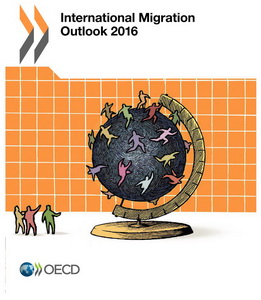 The 2016 edition of the International Migration Outlook analyses recent developments in migration movements and policies in OECD countries and selected non-OECD countries, and looks at the evolution of the labour market outcomes of recent immigrants in OECD countries. The report includes two special chapters: “The economic impact of migration: Why the local level matters” and “International migration following environmental and geopolitical shocks: How can OECD countries respond?”, as well as country notes and a statistical annex.
The 2016 edition of the International Migration Outlook analyses recent developments in migration movements and policies in OECD countries and selected non-OECD countries, and looks at the evolution of the labour market outcomes of recent immigrants in OECD countries. The report includes two special chapters: “The economic impact of migration: Why the local level matters” and “International migration following environmental and geopolitical shocks: How can OECD countries respond?”, as well as country notes and a statistical annex.
On average, over the past decade more than 4 million new permanent migrants settled in OECD countries each year (4.8 million for 2015). Temporary migration has also increased. OECD countries registered 1.65 million asylum applications in 2015, double 2014 levels, but still a relatively small part of migration to OECD countries.
The share of the public holding anti-immigration views has grown, driven by concerns that borders are insecure, immigrants stretch local services and some do not want to integrate. In part, this is due to the perception that no end is in sight for large migration inflows and that countries have lost control over them.
Migration is clearly a fact of our life and is here to stay. The 2016 OECD International Migration Outlook stresses that systematic and co-ordinated action is needed to vigorously address these concerns and tap into the many opportunities that migration offers to recipient economies and societies.
Source: www.oecd.org
 Government of the Republic of Serbia
Government of the Republic of Serbia















 pdf [271 KB]
pdf [271 KB]
Leave a Comment